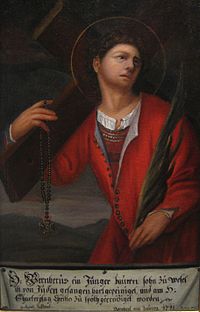Werner of Oberwesel
| Saint Werner of Oberwesel (cult suppressed) |
|
|---|---|

Painting of Werner in the Jewish Museum, Berlin.
|
|
| Born | 1271 Womrath, Hunsrück |
| Died | 1287 Womrath, Hunsrück |
| Venerated in | Roman Catholic Church (Diocese of Trier) |
| Canonized | 1426-1429 |
| Feast | April 19 |
| Attributes | sickle, shovel, pan |
| Patronage | Winemakers |
| Controversy | Blood libel |
|
Catholic cult suppressed
|
1963 |
Werner of Oberwesel (also known as Werner of Bacharach or Werner of Womrath; 1271 – 1287) was a 16-year-old boy whose unexplained death was blamed on Jews, leading to revenge killings of Jews across Europe. He was venerated as a Christian saint, and his memorial day was 19 April.
Saint Werner's Chapel in Oberwesel on the Rhine was established in 1289 and became a popular pilgrimage site. His veneration prompted other allegations against Jews, such as Host desecration and ritual murder.
Born in 1271 in Womrath, Hunsrück, Werner came from a poor background. On Maundy Thursday 1287, his body was found near Bacharach. Certain Christians blamed his murder on the Jews, claiming that they had used his blood for the Jewish ritual of Passover (the blood libel against Jews). Similar anti-Jewish legends were widely circulated in the Middle Ages.
The murder was followed by a wave of pogroms against the Jewish community. Violence spread from the Middle Rhine to the Moselle and the Lower Rhine region. The Jewish community turned to King Rudolf I, who was convinced the accusations were groundless. He fined the murderers of Jews and ordered the burning of the corpse of Werner to prevent any further veneration.
The royal instructions to burn Werner's body, to prevent any further veneration, were not followed. Werner was buried on 30 April 1287 and alleged miracles began to be reported as the veneration spread as a martyr cult. The Cunibert Chapel in Bacharach was expanded beginning in 1289 to become the present Saint Werner's Chapel. The planned expansion of the chapel into a large church remained unfinished after 1338. A further construction also failed owing to the decline of the veneration of martyrs and shrinking revenue to the church from pilgrims.
...
Wikipedia
